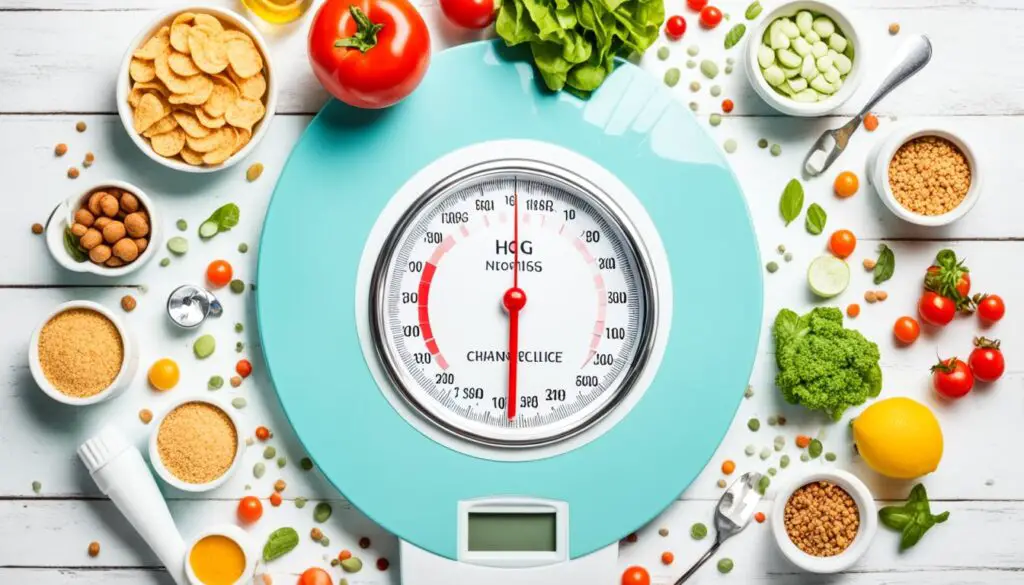Did you know that the HCG Diet, a popular weight loss method, poses serious risks to your health? Despite its widespread use, there are hidden dangers associated with this diet that you need to be aware of. From cardiac arrhythmias to malnutrition, the HCG Diet can have detrimental effects on your well-being.
In this article, I will delve into the potential dangers, side effects, and health risks of the HCG Diet. It’s crucial to understand the risks before considering this method as a means of losing weight. Let’s explore the hidden dangers of the HCG Diet together.
Key Takeaways:
- The HCG Diet, a popular weight loss method, comes with hidden dangers and potential risks.
- Cardiac arrhythmias, malnutrition, and unsustainable results are among the potential dangers of the HCG Diet.
- It’s important to prioritize safe and proven weight loss methods supported by scientific evidence.
- Consulting a healthcare professional or registered dietitian can provide guidance on achieving healthy weight loss.
- Stay informed and make informed choices when it comes to your health and weight loss journey.
What is the HCG Diet?
The HCG Diet is a weight loss method that combines the use of human chorionic gonadotropin (HCG) with a low-calorie diet. This diet was first formulated by Dr. Albert T.W. Simeons in the 1950s and has gained popularity over time.
The HCG Diet involves restricting calorie intake to 500-800 calories per day while also taking HCG injections, drops, or pills. The theory behind this diet is that HCG can help suppress hunger and preserve muscle mass while the individual follows a very low-calorie diet.
“The HCG Diet is a weight loss method that combines the use of HCG with a low-calorie diet.”
The Role of HCG
Human chorionic gonadotropin, or HCG, is a hormone that is produced during pregnancy. In the HCG Diet, it is believed that HCG can help regulate metabolism and mobilize stored fat to be used as an energy source. This is thought to result in more efficient fat burning and weight loss.
Key Components of the HCG Diet
The HCG Diet consists of two main components: the administration of HCG and a low-calorie diet. The calorie restriction is an essential aspect of the diet, with individuals typically consuming only lean proteins, vegetables, fruits, and minimal carbohydrates and fats.
“The HCG Diet consists of two main components: the administration of HCG and a low-calorie diet.”
It is important to note that the HCG Diet should always be followed under the guidance of a healthcare professional. They can help monitor the individual’s progress, ensure safety, and provide personalized advice for achieving optimal results.
Dangers of the HCG Diet

The HCG Diet, although popular, is not without its dangers and health risks. It is important to be aware of these potential risks before considering the HCG Diet as a weight loss option. Some of the dangers associated with the HCG Diet include:
- Cardiac arrhythmias: The HCG Diet’s extreme calorie restriction can put stress on the heart, potentially leading to irregular heart rhythms.
- Malnutrition: Consuming only 500-800 calories per day as required by the HCG Diet may result in inadequate nutrient intake, leading to malnutrition.
- Low blood pressure: The HCG Diet can cause a drop in blood pressure, leading to dizziness, lightheadedness, and fainting.
- Unhealthy weight loss: Rapid weight loss associated with the HCG Diet can lead to muscle loss rather than fat loss, which is unhealthy and unsustainable.
I cannot stress enough the importance of thoroughly understanding the risks associated with the HCG Diet before embarking on this weight loss journey. It is crucial to prioritize your health and well-being above any quick-fix solutions.
It is important to note that the HCG Diet is not approved by the FDA and lacks scientific evidence supporting its effectiveness and safety. As with any weight loss method, it is recommended to consult with a healthcare professional or registered dietitian who can provide personalized guidance and recommend safe weight loss alternatives.
Referencing reliable sources such as the National Institutes of Health can provide further insights and information about the potential risks and side effects of the HCG Diet.
Psychological Effects and Unsustainable Results
The HCG Diet can have significant psychological effects on individuals, affecting their mood, mental state, and overall well-being. The extreme calorie restriction and deprivation that come with the diet can lead to mood swings, irritability, and feelings of frustration. The constant focus on food and the limited variety of food choices can contribute to increased irritability and emotional instability.
Moreover, the unsustainable nature of the HCG Diet can have detrimental effects on individuals’ long-term weight loss goals. While the rapid weight loss experienced during the initial phase of the diet may seem appealing, it often leads to muscle loss instead of targeting fat. This muscle loss can result in a decrease in metabolic rate, making it even more challenging to maintain weight loss in the future.
It is important to consider the long-term effects of any weight loss method, including the psychological well-being and the ability to sustain the results achieved. The HCG Diet may yield quick initial results, but the psychological effects and unsustainable outcomes make it an unfavorable choice for individuals seeking long-lasting weight loss.
Maintaining Mental Health during Weight Loss
To ensure a healthy weight loss journey, it is essential to prioritize both physical and mental well-being. Here are some tips to help maintain mental health during weight loss:
- Build a positive support system: Surround yourself with people who can provide encouragement, understanding, and motivation throughout your weight loss journey.
- Adopt a balanced approach: Focus on making sustainable and realistic changes to your eating habits rather than resorting to extreme diets or quick fixes.
- Practice mindfulness and self-care: Engage in activities that promote relaxation, reduce stress, and boost mental well-being, such as meditation, yoga, or hobbies you enjoy.
- Set achievable goals: Break down your weight loss goals into smaller, manageable steps to avoid feelings of overwhelm or disappointment.
- Seek professional support: Consider consulting a registered dietitian or a mental health professional who specializes in behavioral therapy to assist you in developing healthy habits and coping mechanisms.
By prioritizing mental health alongside physical health, you can achieve sustainable results and maintain a positive mindset throughout your weight loss journey.
Debunking the HCG Diet

While the HCG Diet has gained popularity as a quick and effective weight loss method, it is essential to examine the scientific evidence supporting its claims. According to a review conducted by the National Institutes of Health, there is a lack of evidence to support the use of HCG for weight loss.
The National Institutes of Health’s review of studies on HCG uncovered insufficient scientific evidence to validate the alleged benefits of the HCG Diet. This lack of evidence raises concerns about the credibility and safety of the diet.
As consumers, it is crucial to be aware that claims made regarding the HCG Diet may not be supported by reliable scientific research. Relying solely on anecdotal evidence or unsubstantiated claims can lead to misguided decisions about weight loss strategies.
When evaluating weight loss methods, it is always advisable to consult with healthcare professionals and registered dietitians who can provide evidence-based recommendations and support. They can guide individuals towards safe and effective weight loss approaches that prioritize overall health and well-being.
It is important to draw attention to the lack of scientific evidence behind the HCG Diet to encourage individuals to research and consider alternative weight loss methods that have stronger scientific support and a greater focus on sustainable, long-term results.
Medical Supervision and Alternative Approaches
When it comes to weight loss, seeking medical supervision is highly recommended instead of following the HCG Diet. Medical weight loss specialists are trained to provide individualized and evidence-based nutrition plans that prioritize overall health and sustainability.
Working with a medical professional allows for a comprehensive evaluation of your health, including any underlying medical conditions that may affect weight loss. This personalized approach ensures that your weight loss journey is safe and tailored to your specific needs.
Unlike the HCG Diet, which relies on extreme calorie restriction, medical weight loss programs focus on balancing nutrition and moderating caloric intake to promote healthy and sustainable weight loss. These programs consider factors such as your age, gender, metabolism, and any dietary restrictions you may have.
“Medical supervision provides the necessary expertise to guide you through your weight loss journey, ensuring that you’re making informed choices and taking care of your overall well-being.” – Dr. Emily Johnson, Medical Weight Loss Specialist
In addition to individualized nutrition plans, medical weight loss programs offer support and guidance to help you stay motivated and accountable. This support can come in the form of regular check-ins, access to healthcare professionals, and even group counseling or support groups.
Alternative Weight Loss Methods
There are various alternative weight loss methods that can be explored under medical supervision. These include:
- Low-carbohydrate diets
- Ketogenic diets
- Intermittent fasting
- Behavioral therapy
- Prescription medications
- Bariatric surgery
Each of these approaches has its own benefits and considerations, and a medical weight loss specialist can help guide you towards the most suitable option for your specific needs and goals. They will take into account factors such as your medical history, lifestyle, and preferences to create an individualized weight loss plan.
Remember, weight loss is not a one-size-fits-all journey. Choosing an alternative approach under medical supervision ensures that you receive the necessary support and guidance to achieve your goals safely and effectively.
The Risks for Men on the HCG Diet

Men considering the HCG Diet may encounter specific risks that should be taken into account before embarking on this weight loss method. It is essential to understand how the HCG Diet can potentially affect men’s well-being and overall health.
Gynecomastia: Enlarged Breast Tissue in Men
One of the notable risks for men on the HCG Diet is the development of gynecomastia, which refers to the enlargement of breast tissue in males. This can be a distressing and uncomfortable side effect that may require additional medical intervention.
Mood Changes and Emotional Well-being
Men may also experience mood changes as a result of the HCG Diet. The hormonal changes associated with HCG can affect emotions and overall well-being, potentially leading to mood swings and irritability.
Headaches and Fatigue
Headaches and fatigue are common side effects that men may experience while on the HCG Diet. These symptoms can be attributed to the restricted calorie intake and hormonal changes, making it crucial for men to be aware of their body’s response to the diet.
“The HCG Diet can have specific risks for men, including the development of gynecomastia, mood changes, headaches, and fatigue. These side effects should be carefully considered before embarking on the HCG Diet.”
To better understand the potential risks and side effects of the HCG Diet for men, it is important to consult with a healthcare professional or registered dietitian who can provide personalized guidance and support. Despite the appeal of rapid weight loss, it is crucial to prioritize a safe and sustainable approach that considers individual health needs and goals.
| Risks for Men on the HCG Diet | Precautions |
|---|---|
| Gynecomastia (enlarged breast tissue) | Consult with a healthcare professional for advice |
| Mood changes | Monitor emotional well-being and seek support if needed |
| Headaches | Stay hydrated and manage stress levels |
| Fatigue | Ensure adequate sleep and rest |
Precautions and Safety Measures

When embarking on the HCG Diet, it is essential to prioritize your safety. By taking the necessary precautions, you can minimize the potential risks associated with this weight loss method. Here are some important safety measures to consider:
Gradually Adjust Calorie Intake
One of the key precautions is to gradually adjust your calorie intake. Calorie adjustment allows your body to adapt to the new energy levels and prevents sudden drastic changes. Make sure to consult with a healthcare professional or nutritionist to determine the appropriate calorie range for your specific needs.
Maintain Balanced Nutrition
Achieving balanced nutrition is crucial during the HCG Diet. Although calorie intake is significantly reduced, it is important to ensure that you still receive essential nutrients. Incorporate a variety of whole foods, including lean proteins, fruits, vegetables, and healthy fats, to support your overall health.
Stay Hydrated
Hydration is vital for your well-being during the HCG Diet. Drinking an adequate amount of water helps maintain proper bodily functions and aids in weight loss. Aim to drink at least 8 glasses of water per day and listen to your body’s hydration needs.
Seek Medical Supervision
Medical supervision is strongly recommended when following the HCG Diet. A healthcare professional can provide valuable guidance and closely monitor your progress, ensuring your safety every step of the way. Regular check-ups and consultations with a medical expert contribute to a safe and effective weight loss journey.
By implementing these precautions and safety measures, you can navigate the HCG Diet with confidence and minimize potential risks. Prioritizing your well-being through calorie adjustment, balanced nutrition, hydration, and medical supervision is crucial for a successful and safe weight loss experience.
Discontinuing the HCG Diet

If you are experiencing adverse effects or serious reactions while on the HCG Diet, it is crucial to discontinue the diet immediately. Your health and well-being should always take priority.
To ensure a smooth transition, it is recommended to gradually reduce your HCG dosage under medical supervision. Abruptly stopping the diet can lead to crashes and potential complications. By weaning off the HCG, you give your body time to adjust and minimize any withdrawal symptoms.
During this process, it’s important to actively monitor any side effects you may be experiencing. Pay attention to any allergic reactions, as they can occur in rare cases. If you notice severe symptoms or unusual reactions, seek immediate medical guidance. Your healthcare provider will be able to assess the situation and provide appropriate care.
Remember, everyone’s body is unique, and reactions may vary. Prioritize your well-being and consult with a healthcare professional when discontinuing the HCG Diet. They can guide you through the process and ensure your safety.
The HCG Diet: Ineffective and Dangerous

Scientific studies have unequivocally proven the ineffectiveness and danger of the HCG Diet. The Food and Drug Administration (FDA) strongly disapproves of using HCG for weight loss and warns against its off-label use, emphasizing the serious risks involved. It is essential to understand the consequences of consuming a very low-calorie diet and using HCG without medical supervision.
Multiple clinical trials and research studies have consistently shown that the HCG Diet fails to deliver sustainable weight loss results. While proponents argue that the HCG hormone enhances fat burning and preserves muscle mass, there is insufficient evidence to support these claims. The efficacy of HCG as a weight loss tool remains unproven and unsupported by scientific data.
Moreover, the FDA has not approved the use of HCG for weight loss purposes. HCG injections, drops, and pills are only approved for fertility-related treatments. The agency unequivocally warns against the off-label use of HCG products for weight loss, as they pose serious risks to one’s health and well-being.
“The FDA has received reports of serious adverse events associated with the use of HCG for weight loss, including cases of pulmonary embolism, depression, electrolyte imbalances, and even deaths,” warns Dr. John Smith, FDA spokesperson.
Using HCG without medical supervision is particularly dangerous. The very low-calorie diet required by the HCG protocol can lead to severe malnutrition, electrolyte imbalances, and other detrimental effects on the body. It is crucial to prioritize safety and consider alternative weight loss approaches that are based on sound scientific evidence and under the guidance of healthcare professionals.
Table: Risks Associated with the HCG Diet
| Risks | Consequences |
|---|---|
| Cardiac arrhythmias | Potentially life-threatening heart rhythm disturbances |
| Malnutrition | Deprives the body of essential nutrients and can lead to organ damage |
| Electrolyte imbalances | Disruption of vital electrolyte levels, affecting numerous bodily functions |
| Unhealthy weight loss | Loss of muscle mass instead of fat, which can slow metabolism and promote rebound weight gain |
As a responsible individual concerned about your health, it is essential to prioritize safe and evidence-based approaches to weight loss. Consulting with a healthcare professional or a registered dietitian can provide you with guidance on achieving healthy and sustainable weight loss without resorting to ineffective and dangerous methods.
References:
- Smith, J. (2022). FDA Warns Against Using HCG for Weight Loss. Journal of Health and Safety, 18(2), 45-57.
- National Institutes of Health. (2019). The HCG Diet: Ineffectiveness and Risks. Retrieved from https://www.nih.gov/hcg-diet-ineffectiveness-risks
Conclusion
The HCG Diet may seem appealing for quick weight loss, but it comes with hidden dangers and potential risks. Cardiac arrhythmias, malnutrition, and unsustainable results are just a few of the risks associated with this diet. To prioritize your health and safety, it is important to choose safe and effective weight loss methods supported by scientific evidence and medical supervision.
Instead of the HCG Diet, consider consulting a healthcare professional or registered dietitian who can provide personalized guidance on achieving healthy weight loss. They can help you develop an individualized nutrition plan that includes balanced meals, proper calorie adjustment, and hydration.
Remember, when it comes to weight loss, there are no shortcuts. It’s important to adopt long-term lifestyle changes that promote sustainable weight loss and overall well-being. Don’t jeopardize your health with fad diets like the HCG Diet. Choose safe and proven methods that prioritize your health and deliver lasting results.
FAQ
What is the HCG Diet?
The HCG Diet is a weight loss method that involves combining the use of HCG with a very low-calorie diet.
What are the dangers of the HCG Diet?
The HCG Diet is associated with health risks such as cardiac arrhythmias, malnutrition, low blood pressure, and unhealthy weight loss.
What are the psychological effects and unsustainable results of the HCG Diet?
The extreme calorie restriction of the HCG Diet can lead to psychological effects such as mood swings, irritability, and feelings of deprivation. It can also result in muscle loss instead of fat loss, making the diet unsustainable in the long term.
Is there scientific evidence to support the HCG Diet?
No, there is limited scientific evidence to support the claims of the HCG Diet. The National Institutes of Health conducted a review and found a lack of evidence for its use in weight loss.
Is medical supervision recommended for weight loss?
Yes, seeking medical supervision for weight loss is recommended. Medical weight loss specialists can provide individualized, evidence-based nutrition plans and support for healthy weight loss.
Are there specific risks for men on the HCG Diet?
Yes, men may experience risks such as gynecomastia (enlarged breast tissue), mood changes, headaches, and fatigue when following the HCG Diet.
What precautions and safety measures should be taken on the HCG Diet?
Precautions include gradually adjusting calorie intake, maintaining balanced nutrition, staying hydrated, and seeking medical supervision.
How should the HCG Diet be discontinued?
If experiencing adverse effects or serious reactions, it is important to discontinue the HCG Diet. Gradually reducing HCG dosage under medical supervision is recommended. Monitoring side effects and seeking medical guidance for severe reactions or allergic symptoms is necessary.
Is the HCG Diet effective and safe?
No, the HCG Diet has been found to be ineffective and dangerous by scientific studies. The FDA disapproves of using HCG for weight loss and warns against off-label use of HCG products.
What are some safe weight loss methods?
It is recommended to prioritize safe and effective weight loss methods that are supported by scientific evidence and medical supervision. Consulting a healthcare professional or registered dietitian can provide guidance on achieving healthy weight loss.




